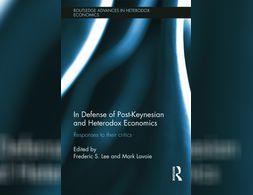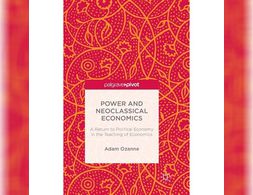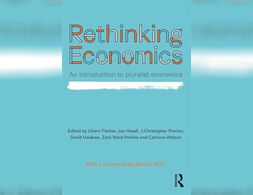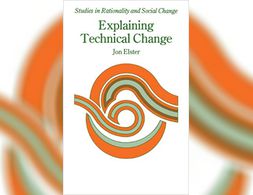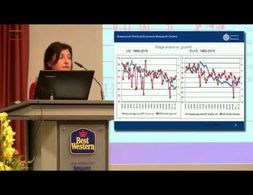537 results
The Handbook on the Economics of Conflict conveys how economics can contribute to the understanding of conflict in its various dimensions embracing world wars, regional conflicts, terrorism and the role of peacekeeping in conflict prevention. The economics of conflict is a relatively new branch of the discipline of economics.
Post-Keynesian and heterodox economics challenge the mainstream economics theories that dominate the teaching at universities and government economic policies. And it was these latter theories that helped to cause the great depression the United States and the rest of the world is in.
Mainstream economics almost completely ignores the role power plays in determining economic outcomes, which means it can only provide partial explanations of the distribution of wealth and income, and of the problems associated with inequality and poverty.
This book represents a new foundation for the study of microeconomics, viewed from a broad perspective that takes into account new developments at the intersections with psychology, political science, the natural sciences and philosophy.
Microeconomics: A Critical Companion offers students a clear and concise exposition of mainstream microeconomics from a heterodox perspective.
Economics is a broad and diverse discipline, but most economics textbooks only cover one way of thinking about the economy. This book provides an accessible introduction to nine different approaches to economics: from feminist to ecological and Marxist to behavioural.
Thirty-years of economic transformation has turned China into one of the major players in the global capitalist economy. However, its economic growth has generated rising problems in inequality, alienation, and sustainability with the agrarian crises of the 1990s giving rise to real social outcry to the extent that they became the object of central government policy reformulations.
The book is offered, in the first instance, to students who are beginners in economics, but some parts of it may be of wider interest.
The three topics, Economic Doctrines, Analysis and Modern Problems, might be the subject of concurrent courses or they may be studied consecutively.
Planetary Mine rethinks the politics and territoriality of resource extraction, especially as the mining industry becomes reorganized in the form of logistical networks, and East Asian economies emerge as the new pivot of the capitalist world-system.
The rise of capitalism to global dominance is still largely associated – by both laypeople and Marxist historians – with the industrial capitalism that made its decisive breakthrough in 18th century Britain.
Those who control the world’s commanding economic heights, buttressed by the theories of mainstream economists, presume that capitalism is a self-contained and self-generating system.
More-is-better ideals such as these have long shaped our vision of rationality. Yet humans and other animals typically rely on simple heuristics to solve adaptive problems, focusing on one or a few important cues and ignoring the rest, and shortcutting computation rather than striving for as much as possible.
This is an important contribution that defends the importance of heterodox economics. It discusses what constitutes heterodox economics as an intellectual, social, and political project, with a range of contributions from leading heterodox thinkers coming from a diversity of theoretical vantage points.
Exploring Economics, an open-access e-learning platform, giving you the opportunity to discover & study a variety of economic theories, topics, and methods.
Technical change, defined as the manufacture and modification of tools, is generally thought to have played an important role in the evolution of intelligent life on earth, comparable to that of language. In this volume, first published in 1983, Jon Elster approaches the study of technical change from an epistemological perspective.
Surviving the Future is a story drawn from the fertile ground of the late David Fleming's extraordinary 'Lean Logic: A Dictionary for the Future and How to Survive It'. That hardback consists of four hundred and four interlinked dictionary entries, inviting readers to choose their own path through its radical vision. Recognizing that Lean Logic's sheer size and unusual structure can be daunting, Fleming's long-time collaborator Shaun Chamberlin has selected and edited one of these potential narratives to create Surviving the Future. The content, rare insights, and uniquely enjoyable writing style remain Fleming's, but are presented here at a more accessible paperback-length and in conventional read-it-front-to-back format
Jo Michell discusses some key implications of climate change regarding the standard policy prescriptions of Post-Keynesian economics, particularly relating to the possible necessity of consumption constraints and the presence of recurrent inflation.
This course will expose students to some of the key debates that link digital transformations to economic, social, and political inequalities. Students will be familiarised with a variety of theoretical movements in development studies and internet studies: exploring thinking that frames the internet as a leveller that can bridge divides vs. exploring the internet as an infrastructure that amplifies existing inequalities.
This course describes Bayesian statistics in which one s inferences about parameters or hypotheses are updated as evidence accumulates You will learn to use Bayes rule to transform prior probabilities into posterior probabilities and be introduced to the underlying theory and perspective of the Bayesian paradigm The course will apply …
The course will teach students to analyze the goals, implementation, and outcomes of economic policy.
How has financialisation changed saving What are its implications on a macro economic level and from a welfare state perspective Craig Berry I PEEL
Özlem Onaran analyses the current problems of secular stagnation from a global perspective. At the core of global economic problems is insufficient demand caused by falling wage shares, because most individual countries, and the world as a whole are “wage-led”. Hence a strategy for global growth is to aim at increasing wages and thus the wage share, and the abandonment of policies focusing purely on national competitiveness. Financialization has broken the link between corporate profitability and investment. Reregulation of finance and higher public investment is required in order to crowd in private investment, in this way, reversing the declining trend of potential output growth.
In this paper the main developments in post-Keynesian macroeconomics since the mid- 1990s will be reviewed. For this purpose the main differences between heterodox economics in general, including post-Keynesian economics, and orthodox economics will be reiterated and an overview over the strands of post-Keynesian economics, their commonalities and developments since the 1930s will be outlined. This will provide the grounds for touching upon three important areas of development and progress of post-Keynesian macroeconomics since the mid-1990s: first, the integration of distribution issues and distributional conflict into short- and long-run macroeconomics, both in theoretical and in empirical/applied works; second, the integrated analysis of money, finance and macroeconomics and its application to changing institutional and historical circumstances, like the process of financialisation; and third, the development of full-blown macroeconomic models, providing alternatives to the mainstream 'New Consensus Model' (NCM), and allowing to derive a full macroeconomic policy mix as a more convincing alternative to the one implied and proposed by the mainstream NCM, which has desperately failed in the face of the recent crises.
The effects of the 2020 pandemic on the Latin-American region: a thorough before-after analysis.
Foundational economy is the most important concept you have never heard of. The foundational encompasses material utilities like water, gas and electricity and providential services like education, health and care. Taken together, these services matter economically and politically because they are the collectively consumed infrastructure of everyday life, the basis of civilization and should be citizen rights.
Nous utilisons des cookies sur notre site Web. Cliquez sur Accepter pour nous aider à améliorer constamment Exploring Economics !


